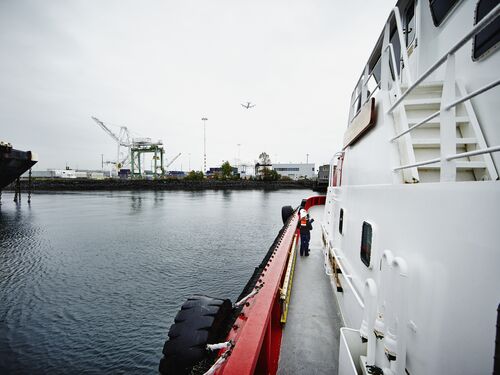GRP Welcomes Early-Career Research Fellows in Offshore Energy Safety and Human Health and Community Resilience
News Release
By Pete Nelson
Last update September 4, 2025
WASHINGTON — The Gulf Research Program (GRP) of the National Academies of Sciences, Engineering, and Medicine announced today its 2025-2027 cohort of Early-Career Research Fellows in the Offshore Energy Safety and Human Health and Community Resilience tracks.
“Our Early-Career Research Fellows are pursuing innovative and applied research that directly addresses the Gulf region’s most pressing challenges,” said Karena Mothershed, director of GRP’s Board on Gulf Education and Engagement. "Their research not only advances science but also provides real-world benefits for communities and ecosystems across the Gulf. We are excited to welcome these exceptional individuals to the 2025 cohort of Early-Career Research Fellows and to continue supporting them as they make a lasting impact on the Gulf region."
Six fellows will join the Offshore Energy Safety track where they will contribute to the understanding of the impacts that offshore energy production and transportation activities have on environmental systems and human communities in the Gulf.
Additionally, eight fellows will join the Human Health and Community Resilience track focused on understanding the role that resilience-based interventions can play in addressing the root causes of climate, disaster, and/or health vulnerability that are associated with health disparities in communities throughout the Gulf region.
The Gulf Research Program’s Early-Career Research Fellowship helps researchers during the critical pre-tenure phase of their careers. Fellows receive a $76,000 financial award along with mentoring support to provide them with independence, flexibility, and a built-in support network as they take risks on untested research ideas, pursue unique collaborations, and build a network of colleagues.
Full bios for our Early-Career Research Fellows can be found here. The new fellows in the Offshore Energy Safety track are:
Aditya Aiyer
Lehigh University
Hantao Cui
North Carolina State University
Fanghui Deng
University of Houston
Kai Gong
Rice University
Shahrzad Roshankhah
University of Utah
Shiqiang (Nick) Zou
Michigan State University
Pending final agreements, the new fellows in the Human Health and Community Resilience track are:
Christopher Bolden
Xavier University of Louisiana
Fabio Capra-Ribeiro
Louisiana State University
Ishi Keenum
Michigan Technological University
Natasha Malmin
Georgia State University
Zhihong Pang
Louisiana State University
Ming Xie
University of Maryland, Baltimore County
Zongliang Yue
Auburn University
Lei Zou
Texas A&M University
The National Academies’ Gulf Research Program (GRP) is an independent, science-based program founded in 2013 as part of legal settlements with the companies involved in the 2010 Deepwater Horizon disaster. The GRP’s mission is to develop, translate, and apply science to enhance the safety of offshore energy, the environment, and the wellbeing of the people of the Gulf region for generations to come. It supports innovative science, guides data design and monitoring, and builds and sustains networks to generate long-term benefits for the Gulf region and the nation. The program has $500 million for use over 30 years to fund grants, fellowships, and other activities in the areas of research and development, education and training, and monitoring and synthesis.
The National Academies of Sciences, Engineering, and Medicine are private, nonprofit institutions that provide independent, objective analysis and advice to the nation to solve complex problems and inform public policy decisions related to science, engineering, and medicine. They operate under an 1863 congressional charter to the National Academy of Sciences, signed by President Lincoln.
Contact:
Pete Nelson,
Director of Public Engagement and Communications
Gulf Research Program
Email pnelson@nas.edu
More like this
Events
Right Now & Next Up
Stay in the loop with can’t-miss sessions, live events, and activities happening over the next two days.
NAS Building Guided Tours Available!
Participate in a one-hour guided tour of the historic National Academy of Sciences building, highlighting its distinctive architecture, renowned artwork, and the intersection of art, science, and culture.


